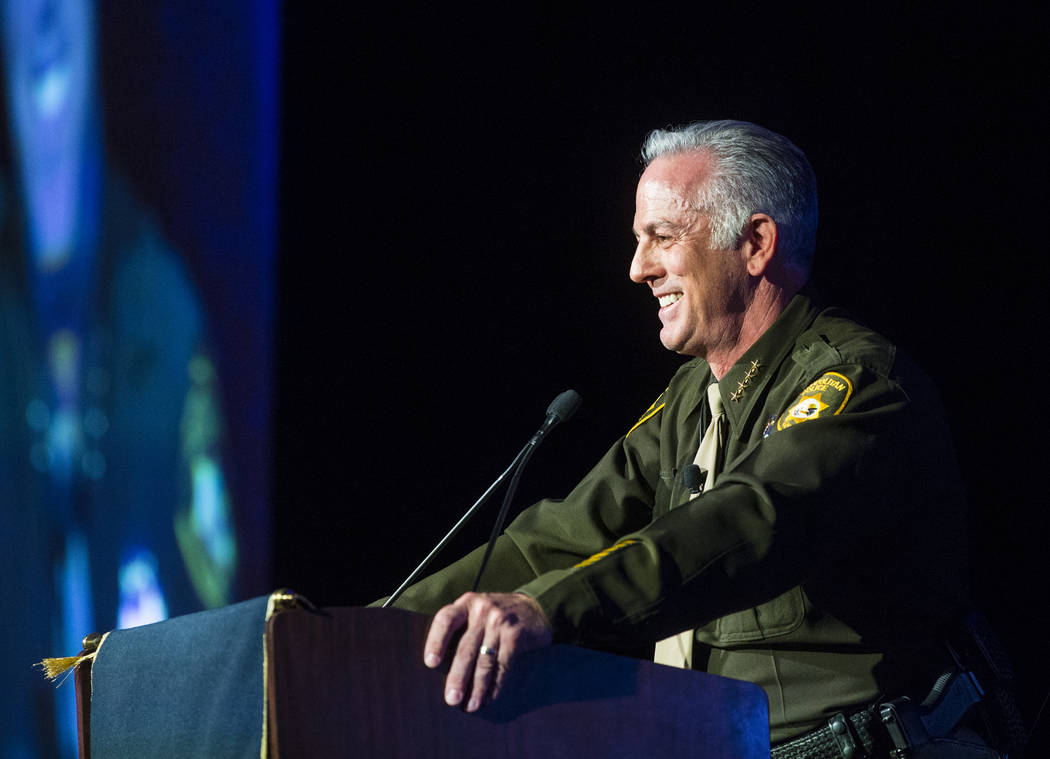Las Vegas police stop detaining low-level offenders for ICE
Clark County Sheriff Joe Lombardo directed corrections officers in December to stop placing immigration holds on undocumented immigrants with low-level traffic bench warrants.
The sheriff said he took the action Dec. 21. The directive applies to an agreement made with U.S. Immigration and Customs Enforcement, known as a 287(g) agreement, which deputizes officers to act as immigration agents. Under the agreement, Metropolitan Police Department officers check whether people booked into the county jail are wanted for deportation proceedings and then detain them for ICE.
Lombardo sent a statement Wednesday to the Las Vegas Review-Journal in reference to a rally Feb. 7 outside Metro headquarters protesting the department’s cooperation agreement with the immigration agency.
“As I appreciate people’s right to protest, these changes were made as a result of good policy and my intent to address the worst violators of criminal law,” he said in that statement.
The change applies to people with only low-level traffic bench warrants, Lombardo said in a statement posted on social media.
“I was not forced to change policy,” he said. “I made the change because it was the right thing to do when I did it.”
It was not immediately clear whether that policy has been formalized in writing.
In an interview Tuesday, Metro lobbyist Chuck Callaway said that Lombardo had heard stories of people with families in Las Vegas or who had lived in the country for years who found themselves facing deportation for a violation as minor as a traffic ticket.
“The sheriff wants to ensure that something like that doesn’t occur,” he said.
Callaway had signaled the change to lawmakers Friday, when he was asked about the 287(g) agreement at a Nevada Assembly Judiciary Committee hearing.
“I know that the jail is in the process of moving forward with that,” he told lawmakers.
Metro will continue to notify ICE about undocumented individuals accused of more serious offenses, those with significant criminal histories and those who have been deported multiple times, Callaway said.
Callaway said he doesn’t think the change will harm the department’s relationship with ICE.
“I don’t think ICE is gonna declare us a sanctuary city,” Callaway said.
Asked for comment, ICE spokeswoman Paige Hughes emailed a statement to the Review-Journal.
“The partnership between the U.S. Immigration and Customs Enforcement and Las Vegas Metropolitan Police Department remains an effective program for enhancing the safety and security of the Las Vegas communities,” the statement reads in part. “The current 287(g) memorandum of agreement states that ICE enforcement priorities are agreed to and will be followed.”
Reached Tuesday, Clark County Commissioner Tick Segerblom expressed optimism about the change but said he wants to see how it plays out in practice.
“It’s a positive step,” he said.
Segerblom joined the activists outside Metro headquarters on Feb. 7 to call for changes to Metro’s cooperation with ICE. The activists have filed a records request seeking information on the department’s relationship with ICE, including the 287(g) agreement.
In a statement, the Arriba Las Vegas Worker Center welcomed acknowledgment of the problem but said the directive doesn’t address concerns that people may still be targeted for deportation over minor crimes.
Segerblom said he remains concerned about the practice of questioning those arrested about their citizenship status, adding that everybody should feel comfortable interacting with the police free of fear.
“That’s not a question that should be asked,” he said.
Amy Rose, legal director of the ACLU of Nevada, said changing the policy is a great idea but “absolutely not enough.”
“We really want to see them stop that policy entirely,” she said.
Local law enforcement holding people for ICE violates Fourth Amendment due process protections against detention without probable cause, particularly for a civil matter like immigration, Rose said.
She was also skeptical of the public declaration of a change without seeing the policy in writing.
At last Friday’s hearing, Callaway told lawmakers that Metro officers do not take immigration enforcement actions on the streets.
“We believe that it deteriorates partnerships with the community and it also makes some folks afraid to come forward to report crime or to interact with officers,” Callaway said.
Contact Mike Shoro at mshoro@reviewjournal.com or 702-387-5290. Follow @mike_shoro on Twitter.
























